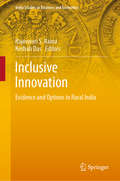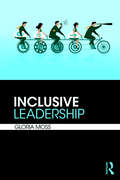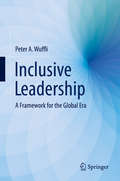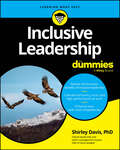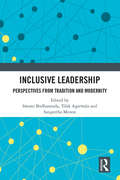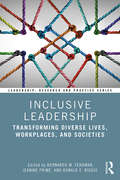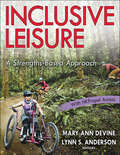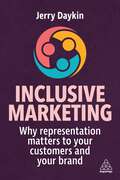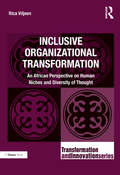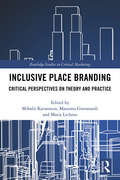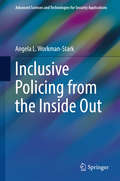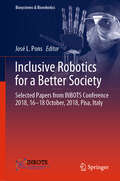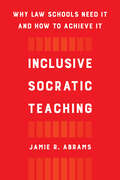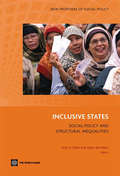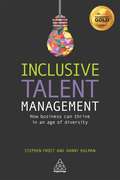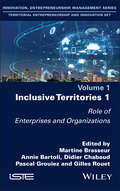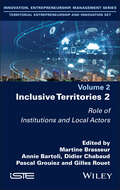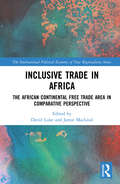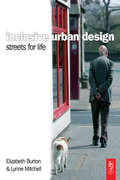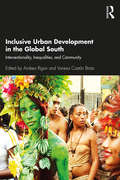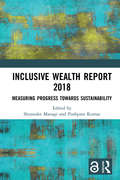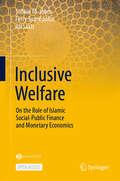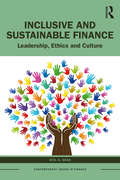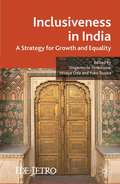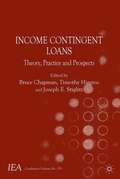- Table View
- List View
Inclusive Innovation: Evidence and Options in Rural India (India Studies in Business and Economics)
by Keshab Das Rajeswari S. RainaThis book discusses the role of inclusive innovation for development in rural India. It uses the evidence of innovation in the context of skewed or limited livelihood options and multiple knowledge systems to argue that if inclusive innovation is to happen, the actors and the nature of the innovation system need reform. The book presents cases of substantive technological changes and institutional reforms enabling inclusive innovation in rural manufacturing, sustainable agriculture, health services, and the processes of technological learning in traditional informal networks, as well as in formal modern commodity markets. These cases offer lessons to enable learning and change within the state and formal science and technology (S&T) organizations. By focusing on these actors central to development economics and innovation systems framework, the book bridges the widening conceptual gaps between these two parallel knowledge domains, and offers options for action by several actors to enable inclusive innovation systems. The content is thus of value to a wide audience consisting of researchers, policy makers, NGOs and industry observers.
Inclusive Leadership
by Gloria MossThis book breaks important new ground in describing the enhancements in performance, motivation and mental well-being that Inclusive Leadership brings to organisations. Illustrating these benefits through theory and practical examples, the book also contrasts this style with Command and Control or ‘Transactional’ leadership, a style that still holds sway in many organisations, with leaders focused on mistakes rather than progress. Inclusive Leadership will transport you through time and geography – from the UK, US, and Australia to France and Norway – showing how much more nurturing an environment Inclusive Leadership provides than Transactional leadership. Read how Inclusive Leadership complements a competitive strategy emphasising innovation and how it dominates in four organisations – Royal Mail Sales, the PageGroup, Sevenoaks School and APAM - spanning sales, recruitment, education and real estate. The chapters also cover education and the associations between Inclusive Leadership and enhanced undergraduate student performance, motivation and engagement both in Norway and in the UK. With a unique combination of both theoretical and practical perspectives, this book is a useful tool for practitioners in the corporate world; business, management and leadership students; and both emerging and established leaders.
Inclusive Leadership
by Peter A. WuffliThis insightful management book introduces an inspirational new ethics-oriented approach to business and leadership for current and future leaders. It argues that the challenges of today's global era require a new, more holistic and ethical leadership approach than conventional concepts suggest. A framework for the concept of "inclusive leadership" is developed by linking leadership challenges and tasks to the transforming world. Based on over thirty years professional experience in various sectors of society and in both executive and advisory roles in business, the author offers practical suggestions on how to apply inclusive leadership in day-to-day activities. The book also emphasizes how ethics and virtues should influence and shape leadership, a link that is often absent in conventional leadership literature. Building a bridge between theory and practice, this book offers both practical and academic perspectives, with the ideas and concepts illustrated with many real-life examples.
Inclusive Leadership For Dummies
by Dr. Shirley DavisStrategies for creating a welcoming, equitable, and high-performing work environment Inclusive Leadership For Dummies helps leaders successfully navigate the nuances of a diverse workforce and create a culture where ALL talent can thrive. Toss out the one-size-fits-all leadership approaches, because the workforce is not a monolith—it’s a rich and beautiful tapestry made up of people from all backgrounds, cultures, skills, and experiences. This book enables you to develop the knowledge and competencies needed to lead diverse teams successfully. It also provides tips, tools, and techniques, for how to proactively respond to external pressures and disruptions like the changing workforce, marketplace, and the political and economic climate for how to foster and ensuring that all employees are included, valued, they feel safe, and they can do their best work. Discover the concept of inclusive leadership and learn what inclusive leaders do Evolve your own thinking and behaviors to promote inclusivity and a welcoming atmosphere Minimize your blind spots in meetings and interactions and overcome any blunders or pitfalls Gain inspiration from case studies of effective inclusive leadersFor emerging, mid-level, and senior leaders who want to foster greater trust, psychological safety, and a high performing work environment that leverages (or celebrates) all attributes of diversity Inclusive Leadership For Dummies is the resource for you.
Inclusive Leadership: Perspectiives from Tradition and Modernity
by Sangeetha Menon Swami Bodhananda Tilak AgerwalaThis book reflects on the models of leadership espoused by ancient Indic traditions, in particular the Advaita Vedanta tradition. Focusing primarily on the Rajarshi – ‘the philosopher king’ – the essays in this volume showcase how using these models in contemporary society could lead to the creation of self-aware and empathic leaders and an inclusive society. The book explores examples of the Brahmarshi, or the wise scholar; Rajarshi, or the wise ruler; and Devarshi, or the visionary, to bring together all the ideal virtues of inclusive leadership in the current cultural and political space. The essays in the volume adopt a critical sociological, philosophical and management lens to analyse Indic traditions and dharmic concepts. The volume uses concepts such as dharma, karma and, yoga along with organisational psychology, technology, and management, to arrive at the concept of transcendental leadership. It theorises new definitions of the Rajarshi ideal, which can be used towards public service, social transformation and self-discovery. The volume will be useful for scholars and academics interested in Indic philosophies of leadership and governance, sociology, and social and political inclusivity. It will also be useful for readers in public administration, business and management.
Inclusive Leadership: Transforming Diverse Lives, Workplaces, and Societies (Leadership: Research and Practice)
by Bernardo M. FerdmanIn a time of increasing divisiveness in politics and society there is a desperate need for leaders to bring people together and leverage the power of diversity and inclusion. Inclusive Leadership: Transforming Diverse Lives, Workplaces, and Societies provides leaders with guidance and hands-on strategies for fostering inclusion and explains how and why it matters. Inclusive Leadership explores cutting-edge theory, research, practice, and experience on the pivotal role of leadership in promoting inclusion in diverse teams, organizations, and societies. Chapters are authored by leading scholars and practitioners in the fields of leadership, diversity, and inclusion. The book is solidly grounded in research on inclusive leadership development, diversity management, team effectiveness, organization development, and intergroup relations. Alongside the exhaustive scholarship are practical suggestions for making teams, groups, organizations, and the larger society more inclusive and, ultimately, more productive. Leaders and managers at all levels, HR professionals, and members of diverse teams will find Inclusive Leadership invaluable in becoming more effective at cultivating inclusive climates and realizing its many benefits—including innovation, enhanced team and organizational performance, and social justice. For more, visit: https://inclusiveleader.com
Inclusive Leisure: A Strengths-Based Approach
by Lynn Anderson Mary Ann DevineInclusive Leisure: A Strengths-Based Approach With HKPropel Access blends theoretical and practical information to prepare students to apply the concept of inclusivity to all aspects of the leisure and recreation field. <P><P> Inclusive Leisure delivers foundational content to help readers understand inclusion and applies this knowledge to practical and applied scenarios. Grounded in a strengths-based approach, which focuses on a person’s abilities rather than their limitations, the comprehensive text moves beyond programming and service delivery by exploring how inclusivity can be applied to administrative practices, organizational philosophy, personnel practices, infrastructure design, community relations, marketing, and more.
Inclusive Marketing: Why Representation Matters to Your Customers and Your Brand
by Jerry DaykinGrow your brand and reach new consumers by creating more impactful and effective marketing that meaningfully reflects and appeals to a diverse customer profile and marketplace. The job of marketing is to understand, respond to and connect with consumers. Perhaps more so than any other sector it's essential that it fully embraces the diversity and nuances of society. Inclusive Marketing provides a practical blueprint to embedding true representation across the entire marketing process, from initial insights and briefs to the production process and channels used to launch campaigns. Doing so will not only help drive wider inclusion and positively challenge stereotypes in society but also create competitive advantage and connect you with new customers. Inclusive Marketing combines clear actionable guidance with checklists, key questions and practical and personal insights from senior marketing leaders including Professor Mark Ritson and Sarah Jenkins, the MD of Saatchi & Saatchi. With a foreword by Nicola Mendelsohn (VP at Meta), it also contains examples and perspectives from iconic brands including Guinness, YouTube, Cadbury, Microsoft and Jim Beam. This is an essential resource for those working on both agency and client sides in companies of all sizes looking to unlock the power of inclusion in marketing.
Inclusive Organizational Transformation: An African Perspective on Human Niches and Diversity of Thought (Transformation and Innovation)
by Rica ViljoenGlobalization, consumerism, legislation and human rights issues impact on workplace demographics, changing the very nature thereof. It is of strategic importance to ensure that the benefits of diverse viewpoints and stakeholders are leveraged. However the underlying worldviews of economists, business leaders and consultants are often informed from a Western paradigm and solutions proposed and interventions facilitated are not integrated, integral, systemic or congruent with the containing environment or ecology. In Inclusive Organizational Transformation, Dr Rica Viljoen acknowledges that diversity of thought presents both gifts and challenges to leadership in multi-national organizations. The existential question with which an individual is confronted impacts on his or her worldview. By continuously applying a specific worldview, certain gifts manifest. These are called Human Niches. Here, Inclusivity is positioned as a radical transformational methodology with the purpose of unleashing the benefits of engagement and diversity of thought. The process of Inclusivity enables organizations to optimize the gifts of and contributions from a diverse workforce and unleash tacit knowledge. Case studies from Ghana, South Africa, and one where the same strategy had to be implemented in Australia, Peru and Tanzania are included and insights gained from the dynamics observed are shared. A synthesis of Inclusivity is presented in a model, meta-insights are derived and the prerequisites for Inclusivity on individual, group and organizational domain are illustrated.
Inclusive Place Branding: Critical Perspectives on Theory and Practice (Routledge Studies in Critical Marketing)
by Mihalis Karavatzis Massimo Giovanardi Maria LichrouPlace branding is often a response to inter-place competition and discussed as if it operated in a vacuum, ignoring the needs of local communities. It has developed a set of methods – catchy slogans, colourful logos, ‘star-chitects’, bidding for City of Culture status etc. – that are applied as quick-fix solutions regardless of geographical and socio-political contexts. Critical views of place branding are emerging which focus on its unexplored consequences on the physical and social fabric of places. These more critical approaches reveal place branding as an essentially political activity, serving hidden agendas and marginalizing social groups. Scholars and practitioners can no longer ignore the need for more responsible and socially sensitive approaches to cater for a wider range of stakeholders, and which fully acknowledge the importance of resident participation in decision-making. The contributions in this innovative book set out to introduce new critical ways of thinking around place branding and practices that encourage it to be more inclusive and participatory. It will be of interest to researchers and advanced students of branding, critical marketing, and destination marketing as well as critical tourism and environmental design.
Inclusive Policing from the Inside Out
by Angela L. Workman-StarkThis book provides a roadmap for how police services can address incivility in the workplace and become more inclusive from the inside out. In the past few years policing has come under increased scrutiny due to a number of police-involved shootings and in-custody deaths, where systemic racism, the inability to effectively confront persons suffering from mental illness, and excessive use of force have been perceived by civil rights groups to play a significant factor. These deaths and the subsequent public outcry have led to various constituents questioning the legitimacy of the police. The book incorporates real stories of police officers and case studies of select police organizations. A look inside a number of these departments has identified an equal concern for incivility within the workplace in the form of gender and ethnic harassment and discrimination. The costs of workplace incivility can be significant as workplace victims are not only likely to decrease their work effort, quality of work, and their level of commitment to the organization, they are also likely to mistreat others in the workplace and to take their frustrations out on those they serve. While these costs have a significant impact for police organizations, incivility by police officers against members of the public can have a much greater impact in terms of eroding perceptions of police legitimacy. This book takes a unique approach in providing a model for police organizations to pursue in becoming more inclusive. To this end, this book will be very relevant for police practitioners, reform advisors, researchers, and graduate-level course in special topics.
Inclusive Robotics for a Better Society: Selected Papers from INBOTS Conference 2018, 16-18 October, 2018, Pisa, Italy (Biosystems & Biorobotics #25)
by José L. PonsThe book reports on advanced topics in interactive robotics research and practice; in particular, it addresses non-technical obstacles to the broadest uptake of these technologies. It focuses on new technologies that can physically and cognitively interact with humans, including neural interfaces, soft wearable robots, and sensor and actuator technologies; further, it discusses important regulatory challenges, including but not limited to business models, standardization, education and ethical–legal–socioeconomic issues. Gathering the outcomes of the 1st INBOTS Conference (INBOTS2018), held on October 16–20, 2018 in Pisa, Italy, the book addresses the needs of a broad audience of academics and professionals working in government and industry, as well as end users. In addition to providing readers with detailed information and a source of inspiration for new projects and collaborations, it discusses representative case studies highlighting practical challenges in the implementation of interactive robots in a number of fields, as well as solutions to improve communication between different stakeholders. By merging engineering, medical, ethical and political perspectives, the book offers a multidisciplinary, timely snapshot of interactive robotics.
Inclusive Socratic Teaching: Why Law Schools Need It and How to Achieve It
by Jamie R. AbramsFor more than fifty years, scholars have documented and critiqued the marginalizing effects of the Socratic teaching techniques that dominate law school classrooms. In spite of this, law school budgets, staffing models, and course requirements still center Socratic classrooms as the curricular core of legal education. In this clear-eyed book, law professor Jamie R. Abrams catalogs both the harms of the Socratic method and the deteriorating well-being of modern law students and lawyers, concluding that there is nothing to lose and so much to gain by reimagining Socratic teaching. Recognizing that these traditional classrooms are still necessary sites to fortify and catalyze other innovations and values in legal education, Inclusive Socratic Teaching provides concrete tips and strategies to dismantle the autocratic power and inequality that so often characterize these classrooms. A galvanizing call to action, this hands-on guide equips educators and administrators with an inclusive teaching model that reframes the Socratic classroom around teaching techniques that are student centered, skills centered, client centered, and community centered.
Inclusive States: Social Policy and Structural Inequalities
by Anis A. Dani Arjan De HaanThe heterogeneity of social structures and cultural identities in many developing countries, together with traditional hierarchies, rivalries, and deep-seated biases, has perpetuated inequities. Inclusive States: Social Policy and Structural Inequalities examines the role of the state and society in addressing structural inequalities and identifies a set of policy recommendations to redress them. This book defines structural inequality as a condition arising from unequal status attributed to a category of people in relation to others, a relationship perpetuated and reinforced by unequal relations in roles, functions, decision rights, and opportunities. Inclusive states are those that direct policies to address the needs of all, that respect the rights of citizens to exercise voice and influence on which services are provided and how they are delivered, and that have an interest in strengthening the social contract with their citizens. A central focus of policy remains a concern for equity, both to level the playing field to encourage social mobility and to ensure equity in the distributional effects of policy reforms and development interventions. This book highlights two key challenges for social policy. First, policy design needs to take into account the weaknesses of basic state functions in many developing countries, since these have important ramifications for social policy outcomes. Second, in most developing countries social structures marked by historically rooted structural inequalities pose significant challenges to the provision of services and require a long-term commitment to address underlying questions and problems. This book describes some of the challenges found in different contexts and some of the ways in which these challenges can be-and are being-addressed. This book is part of a new series, New Frontiers in Social Policy, which examines issues and approaches to extend the boundaries of social policy beyond conventional social services toward policies and institutions that improve equality of opportunity and social justice in developing countries. Other forthcoming titles in the series include Assets, Livelihoods, and Social Policy, and Institutional Pathways to Equity: Addressing Inequality Traps.
Inclusive Talent Management: How Business can Thrive in an Age of Diversity
by Stephen Frost Danny KalmanOrganizations traditionally have had a clear distinction between their policies on diversity and inclusion and their talent management. The main driving force behind diversity and inclusion has been being seen to be a good employer, to be able to make claims in the annual report and to feel as though a positive contribution is being made to society. On the other hand, talent management activities have been driven by a real business need to ensure that the organization has the right people with the right skills in the right place to drive operational success. Inclusive Talent Management aligns talent management and diversity and inclusion, offering a fresh perspective on why the current distinction between them needs to disappear.Featuring case studies from internationally recognised brands such as Goldman Sachs, Unilever, KPMG, Hitachi, Oxfam and the NHS, Inclusive Talent Management shows that to achieve business objectives and gain the competitive advantage, it is imperative that organizations take an inclusive approach to talent management. It puts forward a compelling and innovative case, raising questions not only for the HR community but also to those in senior management positions, providing the practical steps, global examples and models for incorporating diversity and inclusion activities into talent management strategy.
Inclusive Territories 1: Role of Enterprises and Organizations
by Annie Bartoli Gilles Rouet Didier Chabaud Pascal Grouiez Martine BrasseurInequalities and other "social fractures" mark our contemporary economies and societies. While global approaches may have long been sufficient in the past, the focus today is on how local dynamics can make inclusion possible. This two-volume collective work reports on these local dynamics, shedding light on how the creation of inclusive territories can be envisaged and developed. To this end, the involvement of public, private and associative organizations has been identified as one of the conditions for success. In fact, they act both as partners in a territory and as inclusive spaces. Inclusive Territories 1 examines the approaches implemented by several organizations that have made inclusion their wider objective.
Inclusive Territories 2: Role of Institutions and Local Actors
by Annie Bartoli Gilles Rouet Didier Chabaud Pascal Grouiez Martine BrasseurInequalities and other “social fractures” mark our contemporary economies and societies. While global approaches may have long been sufficient in the past, the focus today is on how local dynamics can make inclusion possible. This two-volume collective work reports on these local dynamics, shedding light on how the creation of inclusive territories can be envisaged and developed. To this end, the involvement of public, private and associative organizations has been identified as one of the conditions for success. In fact, they act both as partners in a territory and as inclusive spaces. Inclusive Territories 2 focuses on local partnerships that promote inclusion, presenting existing arrangements and discussing conditions for their impetus. Inequalities and other “social fractures” mark our contemporary economies and societies. While global approaches may have long been sufficient in the past, the focus today is on how local dynamics can make inclusion possible. This two-volume collective work reports on these local dynamics, shedding light on how the creation of inclusive territories can be envisaged and developed. To this end, the involvement of public, private and associative organizations has been identified as one of the conditions for success. In fact, they act both as partners in a territory and as inclusive spaces. Inclusive Territories 2 focuses on local partnerships that promote inclusion, presenting existing arrangements and discussing conditions for their impetus.Inequalities and other “social fractures” mark our contemporary economies and societies. While global approaches may have long been sufficient in the past, the focus today is on how local dynamics can make inclusion possible. This two-volume collective work reports on these local dynamics, shedding light on how the creation of inclusive territories can be envisaged and developed. To this end, the involvement of public, private and associative organizations has been identified as one of the conditions for success. In fact, they act both as partners in a territory and as inclusive spaces. Inclusive Territories 2 focuses on local partnerships that promote inclusion, presenting existing arrangements and discussing conditions for their impetus.
Inclusive Trade in Africa: The African Continental Free Trade Area in Comparative Perspective (The International Political Economy of New Regionalisms Series)
by David Luke Jamie MacleodProviding the first book-length analysis of the African Continental Free Trade Area (AfCFTA), this volume asks how can it be ensured that the AfCFTA is effectively implemented to deliver inclusive trade in Africa. The African Continental Free Trade Area (AfCFTA) will cover an African market of 1.2 billion people and GDP of over $2.5 trillion, across all 55 member States of the African Union. Yet, trade policy increasingly appreciates that free trade is not enough; trade must also be inclusive to deliver developmental benefits. With contributions from leading trade policy authors across Africa and beyond, this book offers insights into the development and implementation of the AfCFTA and serves as a reference for stakeholders interested in trade in Africa more broadly. The contributors assess what important lessons can be drawn from the experiences of regional integration in and beyond Africa, including from success stories like ASEAN as well as from failures like the Free Trade Agreement of the Americas. An important new work for researchers and policymakers focusing on African trade and economic policy, and trade policy more generally.
Inclusive Urban Design: Streets For Life
by Elizabeth Burton Lynne MitchellThis is the first book to address the design needs of older people in the outdoor environment. It provides information on design principles essential to built environment professionals who want to provide for all users of urban space and who wish to achieve sustainability in their designs. Part one examines the changing experiences of people in the outdoor environment as they age and discusses existing outdoor environments and the aspects and features that help or hinder older people from using and enjoying them. Part two presents the six design principles for ‘streets for life’ and their many individual components. Using photographs and line drawings, a range of design features are presented at all scales of the outdoor environment from street layouts and building form to signs and detail. Part three expands on the concept of ‘streets for life’ as the ultimate goal of inclusive urban design. These are outdoor environments that people are able to confidently understand, navigate and use, regardless of age or circumstance, and represent truly sustainable inclusive communities.
Inclusive Urban Development in the Global South: Intersectionality, Inequalities, and Community
by Andrea RigonInclusive Urban Development in the Global South emphasizes the importance of the neighbourhood in urban development planning, with case studies aimed at transforming current intervention practices towards more inclusive and just means of engagement with individuals and communities. The chapters explore how diversity of gender, class, race and ethnicity, citizenship status, age, ability, and sexuality is taken (or not taken) into account and approached in the planning and implementation of development policy and interventions in poor urban areas. The book employs a practical perspective on the deployment of theoretical critiques of intersectionality and diversity in development practice through case studies examining issues such as water and sanitation planning in Dhaka, indigenous rights to the city in Bolivia, post-colonial planning in Hong Kong, land reform in Zimbabwe, and many more. The book focuses on radical alternatives with the potential to foster urban transformations for planning and development communities working around the world.
Inclusive Wealth Report 2018: Measuring Progress Towards Sustainability
by Shunsuke Managi Pushpam KumarThe Inclusive Wealth Index provides important insights into long-term economic growth and human well-being. The Index measures the wealth of nations through a comprehensive analysis of a country's productive base and the country’s wealth in terms of progress, well-being and long-term sustainability. It measures all assets which human well-being is based upon, in particular, produced, human and natural capital to create and maintain human well-being over time.
Inclusive Welfare: On the Role of Islamic Social-Public Finance and Monetary Economics
by Solikin M. Juhro Ferry Syarifuddin Ali SaktiThis open access book serves to spur further development of Islamic economic and financial concepts and practices, particularly in terms of Islamic social-public finance and Islamic monetary policy support. The book has a number of objectives across different aspects. From an academic perspective, the book aims to foster frontier thinking and concepts that advance scientific ideas and teaching materials relating to the Islamic financial system, particularly the role of Islamic social-public finance and Islamic monetary economics. From a policy perspective, the book explores and develops discussions that support public policy innovation, thereby providing comprehensive understanding of policy theories and practices in the Islamic financial system. From a practical perspective, the book is expected to contribute by increasing knowledge and understanding concerning the application and scope of the Islamic economic system. This will confer various benefits to the readers.
Inclusive and Sustainable Finance: Leadership, Ethics and Culture (Contemporary Issues in Finance)
by Atul K. ShahInstead of being a means to an end, finance has become an end in itself and a master of economic actions and priorities. The role of ethics, culture and faith has been diminished by neoliberalism over the last forty years, such that we are living through a profound moral crisis, rising inequality and plutocracy. This practice is destroying the social and trust capital that already exists and is in need of replenishing. This pioneering book draws upon diverse wisdom traditions and their current living business practices to show that not only is another world possible, but it is actually hiding in plain sight. The author argues that our obsession with technocratic economic science has disabled us from exposing the organic and culturally diverse practices of finance. The climate and inequality crises demand new institutional and cultural solutions to transform behaviour and heal the planet. Through real-life examples and case studies, this book illustrates and develops a new organic theory of finance which can be taught and shared all over the world, helping society to prepare for a sustainable and inclusive future. It provides valuable empowerment to experts and professionals from different cultures and traditions to write about their own finance practices and in turn encourage their students and communities to embrace sustainability ideals. There is a global audience for this book, given its multicultural outlook and the diversity of narratives and case studies, from entrepreneurs to MBA students and leaders in accounting and finance. It also has huge relevance for policymakers and educators keen on embracing sustainable finance in their curriculum.
Inclusiveness in India
by Shigemochi Hirashima Hisaya Oda Yuko TsujitaThis bookexamines inclusive growth in a range of social and economic areas in India, includingphysical infrastructure, vulnerable sections of the population and underdeveloped states. It provides acomprehensivestudy of disparity and deepens insight into understanding processes of economic and social development. "
Income Contingent Loans: Theory, Practice, and Prospects (International Economic Association #153)
by Joseph E. Stiglitz Bruce Chapman Timothy HigginsThis study explores the prospect of the application of the basic principles of ICL into many other potential areas of social and economic policy. Using case studies it evaluates previously implemented ICL schemes where interest rate subsidies are usually the norm, and questions the merits of this approach.
